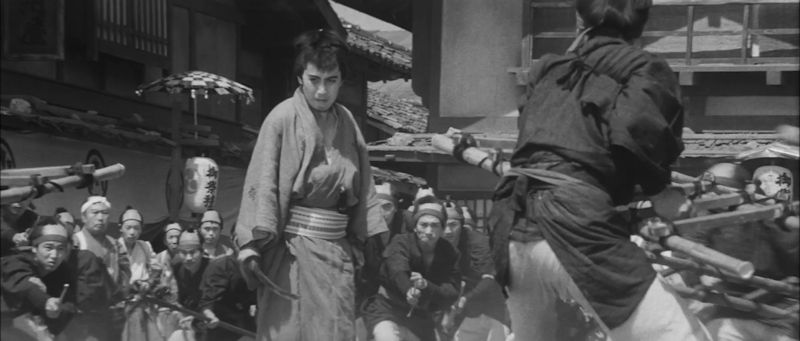
Written by Richard Durrance on 03 Sep 2025
Distributor Radiance • Certificate 15 • Price £17.99
Honourable samurai, Takuma (Raizo Ichikawa), is convinced to take the blame for a killing he did not commit, to ensure the survival of his clan. Leaving behind his fiancé, Namie (Kaoru Yachigusa), Takuma flees as commanded but is told to return in a year by when the truth will be out and his honour returned.
The director of The Betrayal (1966) Tokuzo Tanaka, was responsible for one of the films in Radiance’s earlier release of Daiei Gothic films, The Snow Woman, as well as a number of the Shintaro Katsu Zatoichi films, so that suggested a good balance of visual nous and the ability to film a flashing blade.
Considering the title of the film it will be clear very soon that nothing will quite go to plan. That said, betrayal is a theme that runs throughout the narrative of the film, it’s not a single action but touched on in various forms, whether it's while Takuma is on the run, where he meets two lovers on the verge of suicide or the manner in which his clan, and those leading it, are happy for him to take the fall to save a powerful coward within it. There’s a line from an apparently happy-go-lucky thief Takuma meets along the way named Funajiro (Takuya Fujioka) - "those that are faithless gain, those that are faithful lose". Takuma time and again loses, all while trying to remain faithful to the samurai code. He is not entirely alone in this, but that same code often brings him into conflict even with those that respect him and most often as not pit him against those in positions of power he crosses paths with on his journey, even if they wield it without also exercising the responsibility or humanity that should go with it. As such, the number of enemies or those willing to betray Takuma stack up quickly, but his greatest anger is saved for Jurota (Ichiro Nakatani), one of the few that know the truth of his innocence but who has designs on Namie, firmly shutting the door to a normal life on the luckless Takuma.
Our hero's journey opens his eyes to the world around him; one he naively never saw before. At times this is pleasantly nuanced in the film – there are certainly no overtly leering villains on display. The thief, Funajiro, will both happily steal from Takuma, journey with him, allow his money to be taken from him by Takuma for noble (if tragic) ends and is perhaps one of the most engaging characters in the film. Why? Because he stands for a certain type of pragmatism that isn’t fixed in place by a code. He has his eyes wide open to the world, to its indignities (including those of trying to sleep on an empty stomach) and unlike the samurai you feel he is suited to living in a real world, not one that is rigidly bound to strictures or concepts of honour that fit uneasily outside the dojo. As the film unfolds it touches upon characters and situations often almost in passing, and this is to the film’s credit, because this builds a world around Takuma that can only work to stoke the simmering anger within him, something that explodes in the final fifteen-minutes in a sequence that... well, it’s best discovered for yourself.
It’s also an immensely beautiful film. One of the earliest images in an almost empty dojo, mist trickling inside, feels painterly, and throughout the framing and black and white cinematography of Chikashi Makiura it provides image after image that you could easily frame and put on the wall. Surprisingly so. It’s also a film that intrigues because it feels like it straddles that curious divide between jidaigeki and chanbara. Is it one or the other? In some ways the ending is chanbara, but much of the build-up, how the film world is generated, without ever trying to provoke anger in the audience but subtly constructing the world feels much more in tune with the historical deconstruction of a jidaigeki. Yes, there are moments of action sprinkled throughout the story as it leads up to its explosive ending, but these feel like terse moments of violence and certainly not action for the sake of action.
It seems strange that the film is not better known and that this the first blu-ray available in the world seems baffling, as The Betrayal is 86-minutes of oft beautifully filmed investigation into what it means to be a samurai in a world that does not respect honour and tradition as much as it would like to think; where opportunists will grab what they can and however they wish, even if - as the ending will show us in spectacular fashion - they may come to regret it.


Long-time anime dilettante and general lover of cinema. Obsessive re-watcher of 'stuff'. Has issues with dubs. Will go off on tangents about other things that no one else cares about but is sadly passionate about. (Also, parentheses come as standard.) Looks curiously like Jo Shishido, hamster cheeks and all.
posted by Richard Durrance on 12 Feb 2026
posted by Richard Durrance on 10 Feb 2026
posted by Richard Durrance on 07 Feb 2026
posted by Richard Durrance on 03 Feb 2026
posted by Richard Durrance on 27 Jan 2026
posted by Richard Durrance on 19 Jan 2026
posted by Richard Durrance on 08 Jan 2026
posted by Richard Durrance on 17 Dec 2025